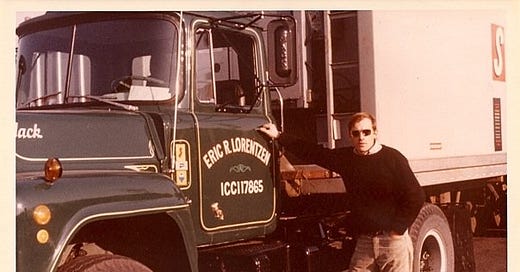This essay originally appeared in the Spring 2020 issue of Sewanee Review.
My father, Ted Lorentzen, in the late 1970s.
No matter how many Westerns I watch, it’s impossible for me to imagine America without its interstate highway system. No matter how many times I see those roads being repaired, depressed, elevated, or diverted, how could it be that they were ever not there at all? And I cannot conceive of an American diet without the banana as a staple.
Nor can I envision those turnpikes without big trucks carrying tens of thousands of bananas here and there. These were the ele- ments of my childhood—big wide roads; two-seat tractors riding high, fast, and loud; boxes and boxes of bananas piled high and deep in the back. All of these were things of the twentieth century, and there was never any reason to believe they’d be around forever.
Saturday mornings with a rag on my hand rubbing wax on the tilted hood of a Mack truck, its engine exposed to the sun. Afternoons spent scraping rust off the steel rims of tires with a diameter almost equal to my height. The evening ritual of cranking the trailer’s landing gear to the ground to steady it while the reefer huffed, keeping the fruit cool for delivery in the morning. Blisters on my hands from tossing nine hundred cardboard cartons, each one full of forty pounds of bananas, onto pallets before dawn. Green stains on my jeans because the dyes on those Chiquita boxes were yellow and blue. Reservoirs in the dashboard full of dimes, nickels, and quarters spit into tollbooth baskets. The smell of diesel flowing through a nozzle I stuck into the exterior tank, under the serrated steps you climbed into the cab. Puffs of smoke spouting from exhaust pipes like little smokestacks. Steel ramps to connect the trailer to the plant, and forklifts to remove the fruit. Cavernous rooms suffused with ripening gas. I remember these things fondly, and I remember wanting to fly away from them.
1.
It was the summer of 2017, and we were at the tip of Hull, Massachusetts, a peninsula that points at Boston from the South Shore like a tickle or an accusation, depending on the box scores. “Why,” my sister asked, about the bottle of Budweiser I’d just bought her, “does it say ‘America’ on the label?” We were at the yacht club a few blocks from the house where our father and his four brothers and sisters and five of their cousins had grown up. The afternoon sky was flashing. We had just visited our grandparents’ graves. In the distance, thunderclouds were raining on the skyscrapers. In a half hour the storm would shunt my cousin’s wedding from the gazebo to the clubhouse. Cash bar, $3 beers, no shots, no unmixed drinks, no drinks outside the clubhouse.
Here was the most ample gathering of cousins we’d seen in years: among the Massachusetts contingent, a dealer in high-tech medical equipment, the manager of a salad dressing and salsa distribution plant; the lobsterman bridegroom; a Marine, back from Afghanistan and posted at the Pentagon, who now liaises with the congressional armed services committees; finally, my sister, a book editor, and me, both of us in town from New York. Absent were the eldest, a rental property manager, a job with a reliable income (“gravy,” said my uncle, who got it for him); and the bridegroom’s sister, who’s been in a feud with her parents since her own wedding— she’s a schoolteacher last I heard.
It’s unlikely all eight of us will be together again until the next funeral. We’re all descended from an Albanian immigrant who started driving a truck and hauling bananas just after World War I. His daughter married the son of a Danish immigrant who took over the business. That night in Hull, not all of their sons and daughters—my father and aunts and uncles—were speaking to each other, but that’s been the case now and then since the 1980s. Back then the three brothers were still in business together haul- ing bananas up the East Coast, under the stenciled banner of their father, Eric R. Lorentzen Trucking Co., in vehicles of no fixed color scheme. They were green when I was a boy, brown when I was a ten, gray when I was a teen, and there was no forgetting they were the reason I wasn’t starving. I ate a lot of bananas a kid. You can never have too many, I was told. You can’t say the same of Budweiser.


